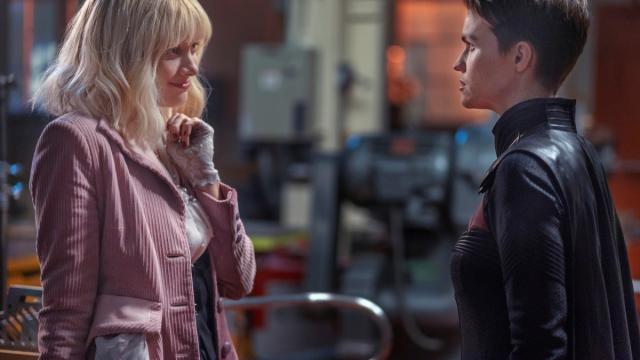A funny thing has happened over the last decade and change. A commonality has been drawn between all the folks dressing up in tights and fighting crime in the funny pages and the larger real-life LBGTQ community. Superheroes don flashy costumes and seem to embrace their truest selves as they fight monsters, aliens, and low-level street criminals. That duality of identity is one many in the LBGTQ community can sympathise with.
While superhero movies and shows have flirted with exploring that commonality, they’ve too often stayed frustratingly straight. Remember ‘s pilot back in 2015? Kara stands on a rooftop, exuberant over her first night out as a hero, and tries to share it with her best friend Winn. Winn just assumes she’s telling him she’s gay.
The Flash, plenty of Batman and X-Men adaptations, and even the Marvel movies have borrowed from the real-life experiences of the LBGTQ community to create a more realistic superhero identity “outing.” But Batwoman feels like the first big property to do it all in the service of an actual queer superhero. And in the last two episodes, the show has spent an awful lot of time considering the very real cost of a gay person staying in the closet
Superheroes don’t usually get to out themselves, right? Clark Kent spent a decade on Smallville worrying about his “secret” being revealed. Batman just avoids relationships rather than telling any woman about his caped crusading truth. Even many of the X-Men live in the closet, wearing glasses or hologram projectors, or just really big coats to hide what they are.
Living in the superhero closet is intended to be a pain and revealing that secret is nearly always viewed as a good thing, ultimately. Just look at Brian Michael Bendis’s latest Superman run, where an entire issue is dedicated to Superman revealing he’s Clark Kent and being, for the most part, loved and accepted. Time and again coming out of the superhero closet is given the same fanfare as Ellen popping up on that cover of Time magazine.
On Batwoman, Kate Kane doesn’t get to come out of the super-closet though. The character is the rare superhero trying her damndest to preserve her two separate identities. Besides one brief moment where she was a little tortured by the secret, Kate has actually been very comfortable with her dual identities. Perhaps because she, more than any straight hero, can understand the necessity of keeping a part of yourself hidden away.
But while Kate may be comfortable with dual identities, she is very much not comfortable with any part of either identity being seen as straight. Kate is a gay woman and proud of that”going so far as to open a gay bar across the street from a restaurant after the owner was homophobic toward her and her ex-girlfriend.
So when the residents of Gotham began to assume her alter ego Batwoman was straight (and shipping her with a hot white dude cop), Kate was offended. In her mind, her sexuality is a crucial element of any identity she possesses. It’s only natural that she insists on outing Batwoman as a lesbian”even if it means people are more likely to figure out that she is the lesbian under the mask. And even if it means incredibly stupid but realistic consequences”like the police refusing to turn on the Bat Signal this week for fear of looking “political” by summoning a lesbian hero. (Don’t worry, protestors got them to change their minds.)
Her ex, Sophie Moore, is not as comfortable with her sexuality. And that”rather than Kate’s secret identity”has been the source of problems between the two women. When they broke up at military school it was because Kate refused to stay in the closet to preserve her career while Sophie was all too willing to. When they reunite, as friends, there’s still tension because Sophie is still terrified and in the closet and, at the beginning of Batwoman, married to a man.
The show makes it clear that Sophie’s not a coward for staying in the closet. Like many closeted individuals, she hides her sexuality out of a need to survive. She’s a middle-class black woman who needs a steady source of income, while Kate is a privileged white woman who can afford to drop out of military school to tool around the world learning the Bat-trade.
The show has, at the very least, paid lip service to Kate’s wealth and whiteness and how that’s afforded her the privilege of being out in a way Sophie is sure she can’t be. But this week, Sophie confronted a captured Alice in an effort to save a kidnapped Kate and found herself finally being forced to confront the costs of being in the closet.
Because, look, no queer person is ever going to rag on another one for being in the closet (unless they’re an unmitigated arsehole). Everyone has their reasons, and they’re often motivated by the need to stay healthy and safe. But there’s still a toll taken by being in the closet. Even when it’s the practical and safe thing to do, it hurts to hide a whole part of your person from others.
And that pain is what Alice latches onto.
Alice might be “mad” and homicidal, but she also fancies herself a hero to some extent, and what she finds heroic is revealing truths. So she’ll hold a buzzsaw to a teenager’s face unless Kate removes her mask”as she did last week”and she’ll shout that she’s doing Kate a service. And she’ll hold Sophie at gunpoint, and then let her live because, to Alice, a life in the closet, a life hiding part of yourself, is far worse than a bullet to the head. And as Sophie breaks down over the moment it sure seems like the show might agree with her.
